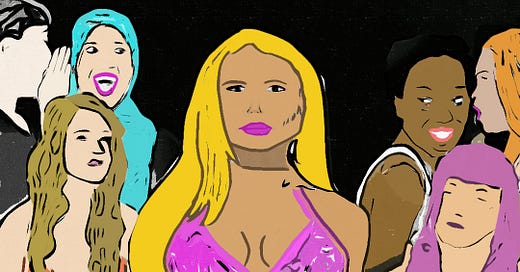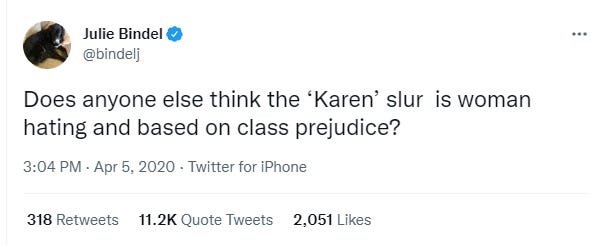We Need To Talk About Karen
Orwell was wrong. It’s not big brother we need to be worried about. It’s big sister.
For those of you who don’t know, “Karen” is a broad term used in memes (visual internet snapshots of popular ideas) to represent a certain kind of entitled woman who is uncritical of her own opinions but highly censorious of others.
Karen, or maybe Karine, cares a lot about abstract things like poor people and animals but also has an intense, negative reaction to actual people who contradict her or don’t show the right amount of enthusiasm for her personal choices. Karen bristles. Your slights are never forgotten or forgiven. They are chalked up. For later. Just - you - wait. I’ve also known women who have ended female friendships because another woman didn’t “like” her Facebook or Instagram posts. The same women whose partner was unfaithful; abused them; worshipped Hitler and wanted to spit in their mouths during sex. It’s odd, but it’s clear that many women find another woman not liking her curtains more egregious than any of the above.
The Karen meme has been around for over 20 years but recently became mainstream and politicised as various sects feminisms did battle for ownership of it. Radical feminists thought it classicist; white intersectional feminists thought it misogynistic; black intersectional feminists objected to white intersectional feminists culturally appropriating their favourite privileged white woman drag.
In truth, no group owns Karen but, in the intersectional scramble created by radical feminist Julie Bindel’s tweet, they all succeeded in embodying her.
Contrary to popular belief, however, Karen is not necessarily a woman.
Jussie Smollett wins my personal prize for being uber Karen of 2019. My odds on favourite for 2020 are any of the #MeToo acolytes who jumped on the #BelieveWomen bandwagon only to bounce when the cart hit a Biden sized bump in the road.
Nor is Karen middle-aged, white, or any other useful stereotype.
Karen is a facet of human nature in all of us, not just white women. She can be a passing mood or an enduring personality trait. Her actions can be benign or malign; can have little impact or catastrophic consequences. But Karen will almost always mistake the triviality of her actions with the weight of their possible consequences, which she usually remains ignorant of.
In the meme, Karen often wants to “speak to the manager” - in the real world, however, Karen often IS the manager.
Here’s a truth we are discovering today about humans. For all the fashionable talk of “empathy”, humans are very able to compartmentalise conflicting emotions to silence cognitive dissonance in order to objectify and ‘other’ others. And not just some, but all humans. Yes, even women and they are perhaps more skilled in this than men.
Right now, during coronavirus lockdown (edit: this was originally published in May 2020. Things have gotten far worse since), law enforcement authorities in supposed liberal democracies have been swamped by neighbours snitching on neighbours for having one jog too many. I’ve seen it myself in community online forums. Communist China must be having a sly smirk to itself.
Orwell was wrong. It’s not big brother we need to be worried about. It’s big sister. And at this point in time, biology has nothing to do with it! You may not be interested in Karen, but Karen is interested in you.
Of course, when calm, Karen would outwardly baulk at the thought that she/he/they objectifies people, but they do.
For instance, she doesn’t call the manager on the single mother who works in Starbucks appreciating the multidimensional, complex individual behind the branded barista uniform and the friendly greeting scripted by the marketing team.
No, she calls the manager on the unskilled oink who has one job to do, but serves her morning cappuccino with too much froth – twice!
Karen has a busy life, performs many roles, including exhausting amounts of unpaid emotional labour, be that childcare or explaining racism to white people, and has a career (not a job).
She is entitled to a decent cup of coffee and service with a smile! And really, what harm does a little outburst here and there matter? Once the tension is released she moves on. No harm done.
So, we have established (via Jessie Smollett) that Karen doesn’t have to be female but I must now proffer one caveat in that she often is. And by female, I explicitly mean the sex with the big gametes, not the small ones. I know things are crazy right now and there are clearly a lot of perks to being female, which is why I totally get the trans thing, but the passive-aggressive element of Karen emerges first and foremost in female adaptive psychology, specifically in the different selection pressures that have shaped the sexes over millions of years.
The profound consequences of a “K” sized ego boost can even be observed in classic literature.
Les Miserables
In Victor Hugo’s Les Miserables, in a chapter entitled, “Madame Victurnien Expends Thirty Francs on Morality” the heroine Fantine is beginning to do well in spite of her previous naivety and misfortune. Yet, as most of us know…
BEWARE - SPOILERS!!
…within four short chapters, Fantine is a hairless, toothless prostitute dying of tuberculosis. What went wrong?
Fantine met a Karen, that’s what.
The aforementioned Madame Victurnien took a dislike to her “ways” and spent thirty francs to find out her secret: an illegitimate child.
After discovering this, Madame ‘Caron’ gossips to Fantine’s floor manager, another Karin “a truly respectable person, firm, equitable, upright, full of the charity which consists in giving, but not having in the same degree that charity which consists in understanding and in forgiving”, who “judged, condemned, and executed Fantine.
And executed she was.
These women, two bastions of the community, emboldened by the insular piety of female normative group-think, might as well have sewn rocks into Fantine’s petticoat and kicked her into a canal. Frankly, that would have been more merciful.
There are two chambers of misery Hugo tells us, “the first is dark, the second is black.”
Here, Hugo echoes that other great dramatist of human nature, Shakespeare, who writes in King Lear, “it is an error to imagine that fate can be exhausted and that one has reached the bottom of anything whatever.”
Yet, in spite of Shakespeare and Hugo, and the wisdom of countless other historical texts written by the wisest minds from the oldest literate cultures, this is an error we in the West, in our state of unprecedented ecological release, commit countless times every day.
Makes me wonder, in the absence of selection pressures, do we create our own?
Due to Karen’s meddling, Fantine loses her job and, unable to pay her bills and creditors, falls into more debt. To keep her child alive, she finally sells all that is left to sell; hair, teeth, and virtue. Only then, does she, mercifully, die of tuberculosis – that other epidemic that was consuming France during the plague of progressive revolutions.
A further, and personal favourite, example of the casual caprice of a Karen casually destroying lives is given to us by Thomas Hardy in Tess of the D’Urbervilles. It might be said that Fantine got herself into trouble of her own accord, she wasn’t raped after all. Tess unfortunately is.
The set-up is as follows.
Tess of the d'Urbervilles
Walking home after some rowdy celebrations, the naive maiden Tess makes the mistake of giggling along with the crowd at a joke made at the expense of a queen bee named “dark Car”.
Now, dark Car can take a joke and is known for her bawdy good humour. This is laughter she can take from her in-group who implicitly know her and their place in the fixed female hierarchy, but who is this new hoity-toity attention whore laughing at her acting like she belongs?
Hell hath no fury like a Karen finding a new girl stepping out of her lane. She must be put in place.
The buxom dark Car lays into the hapless Tess, and the queen bee’s ladies in waiting instantly mobilise into a formidable harpy of Karens against her. (Harpy is my own collective noun for a group of Karens)
Tess is ostracised from the safety of the group, leaving her alone and vulnerable. Enter stage right, the dastardly Alec d’Urberville, dressed in Tarquin’s ravishing strides, ready to ‘save’ her.1
“Ho-ho-ho!” laughed dark Car.
“Hee-hee-hee!” laughed the tippling bride, as she steadied herself on the arm of her fond husband.”
They know exactly what is about to occur and do not intervene because the ultimate female passive-aggressive solution to ousting a rival has presented itself.
“Heu-heu-heu!” laughed dark Car’s mother, stroking her moustache as she explained laconically: “Out of the frying pan into the fire!
Remember, this isn’t Mean Girls. There are no Hollywood Save The Cat beats in these tragedies. As with Fantine, Tess is toast. And Karen is both a passive catalyst and an active executioner.
These examples illustrate a brute evolutionary fact about female relationships: fitting in, having the protection of the group was, until very recently, a matter of life or death. That has left a profound mark on female psychology and female strategies of cooperation and conflict, strategies we see erupting everywhere today and especially in contemporary “cancel culture”.
If it isn’t clear yet, “Karen” is the personification of human hypocrisy, self-deception and self-interest with a specific bias towards adaptive female strategies of conflict.
It’s all fine and dandy lionising supposedly benign female traits, like “empathy” and “equality” but the evidence is right before our eyes that the female of the species can be just as deadly as the male, if by sleight of hand and not recorded in official statistics.
Why is this relevant?
As more women enter politics and managerial positions; as workplace policies become shaped by the invisible hand of female strategies of competition, whilst at the same time we remain both ignorant and in denial about them – this is why we must talk about Karen.
She is the pink elephant in the feminist room, otherwise known as, female intrasexual competition.







Write more ;-)
"That has left a profound mark on female psychology and female strategies of cooperation and conflict, strategies we see erupting everywhere today and especially in contemporary “cancel culture”."
And in the psychology and strategies in womens male orbiters, like how every male feminist turns out to be a raping creep